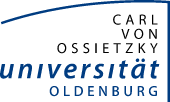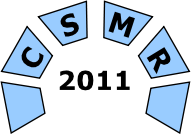
CSMR 2012
European Track
Thursday, March 3, 2011, from 11:00 to 15:30, A14 HS1The European Track provides a wide forum to present, disseminate and discuss ongoing projects funded by EU or national european funding organizations.
The following projects will be presented at CSMR 2011:
- Anne-Marie Sassen - European research in the area of Cloud Computing, Internet of Services and Advanced Software Engineering
- Johan Kraft, Holger Kienle, Thomas Nolte, Ivica Crnkovic, and Hans Hansson - Software Maintenance Research in the PROGRESS Project for Predictable Embedded Software Systems
- Christian Zillmann, Andreas Winter, Werner Teppe, Axel Herget, Marianne Theurer, Andreas Fuhr, Tassilo Horn, Volker Riediger, Uwe Erdmenger, Uwe Kaiser, Denis Uhlig, and Yvonne Zimmermann - The SOAMIG Process Model in Industrial Applications
- Csaba Nagy, László Vidács, Rudolf Ferenc, Tibor Gyimothy, Ferenc Kocsis, and Istvan Kovacs - Solutions for Reverse Engineering 4GL Applications, Recovering the Design of a Logistical Wholesale System
- Roberto Erick Lopez-Herrejon and Alexander Egyed - C2MV2: Consistency and Composition For Managing Variability in Multi-View Systems
- Tom Mens, Leandro Doctors, Naji Habra, Benoit Vanderose, and Flora Kamseu - QUALGEN: Modeling and Analysing the Quality of Evolving Software Systems
- Tanja Vos, Paolo Tonella, Joachim Wegener, Mark Harman, Wishnu Prasetya, Elisa Puoskari, and Yarden Nir-Buchbinder Nir-Buchbinder - Future Internet Testing with FITTEST
- Ljiljana Stojanovic, Felipe Ortega, Luis Cañas, Santiago Dueñas - ALERT: Active support and reaL-time coordination based on Event pRocessing in open source software development
European research in the area of Cloud Computing, Internet of Services and Advanced Software Engineering
Anne-Marie Sassen
The European Union is funding research in the area of software and services. In July a new call for proposals will be published, with a deadline in January 2012. This talk will present the workprogramme for "Objective ICT-2011.1.2 Cloud Computing, Internet of Services and Advanced Software Engineering", and will give an overview of already running projects in this area.
Software Maintenance Research in the PROGRESS Project for Predictable Embedded Software Systems
Johan Kraft, Holger Kienle, Thomas Nolte, Ivica Crnkovic, and Hans Hansson
PROGRESS is a project and strategic research centre at Mälardalen University in Sweden that is funded for 2006--2010 by the Swedish Foundation for Strategic Research (SSF). PROGRESS research targets embedded software in the vehicular, automation, and telecom domains, focusing on the areas of component technology, verification and analysis for predictability, predictable execution, as well as reuse and maintenance of legacy embedded software. We first describe the funding, organization and research areas of PROGRESS, and then give several examples of research that addresses maintenance of legacy embedded software with the goal to improve program comprehension, quality assurance, and debugging. Specifically, we describe research in tracing and trace visualization, impact analysis of temporal behavior, slicing, and system-specific static analyses. F
The SOAMIG Process Model in Industrial Applications
Christian Zillmann, Andreas Winter, Werner Teppe, Axel Herget, Marianne Theurer, Andreas Fuhr, Tassilo Horn, Volker Riediger, Uwe Erdmenger, Uwe Kaiser, Denis Uhlig, and Yvonne Zimmermann
The SOAMIG Project aims at a general migration process model with an emphasis on transformation-based conversion. The SOAMIG Process Model is divided into several phases and disciplines, which describe and organize general migration activities. The process is applied in two industrial software migration projects addressing architecture and code migration.
Solutions for Reverse Engineering 4GL Applications, Recovering the Design of a Logistical Wholesale System
Csaba Nagy, László Vidács, Rudolf Ferenc, Tibor Gyimothy, Ferenc Kocsis, and Istvan Kovacs
Re-engineering a legacy software system to support new, modern technologies instead of old ones is not an easy task, especially for large systems with complex architecture. The use of reverse engineering tools is crucial for different subtasks of the full process, such as re-documenting the old code or recovering its design. There are many tools available to assist developers, but most of these tools were designed to deal with third generation languages (e.g. Java, C, C++, C\#). However, many large systems are developed in higher level languages (e.g. Magic, Informix, ABAP) and current tools are not able to support all the arising problems during re-engineering systems written in fourth generation languages. In this paper we present a project whose main goal is the development of a technologically and functionally renewed medicinal wholesale system. This system is developed in Magic 4GL, and its development is based on re-engineering an old Magic (version 5) system to uniPaaS, which is the current release version of Magic. In the early phases of this project we developed a reverse engineering toolset for Magic 4GL to support reverse engineering, recovering the design of the old system, and to support some forward engineering tasks too. Here we present a report on this project that was carried out in cooperation with SZEGED Software Zrt and the Department of Software Engineering at the University of Szeged. The project was partly funded by the Economic Development Operational Programme, New Hungary Development Plan.
C2MV2: Consistency and Composition For Managing Variability in Multi-View Systems
Roberto Erick Lopez-Herrejon and Alexander Egyed
C2MV2 is an ongoing FP7-People Intra-European Marie Curie Fellowship project that runs for two years. The driving goal of the project is to apply and extend work on incremental consistency management to Software Product Lines that are developed with compositional approaches.
QUALGEN: Modeling and Analysing the Quality of Evolving Software Systems
Tom Mens, Leandro Doctors, Naji Habra, Benoit Vanderose, and Flora Kamseu
In this article we present an ongoing interuniversity research collaboration in the context of a large ERDF- funded research project aiming to enhance and support the quality of evolving software-intensive systems. The project focuses on two aspects in particular, namely the development of a quality metamodel for measuring and controlling the quality of software-related activities, and the instantiation of this framework to measure the quality of evolving libre software distributions from the point of view of different stakeholders.
Future Internet Testing with FITTEST
Tanja Vos, Paolo Tonella, Joachim Wegener, Mark Harman, Wishnu Prasetya, Elisa Puoskari, and Yarden Nir-Buchbinder Nir-Buchbinder
The complexity of the technologies involved in the Future Internet makes testing extremely challenging and demands for novel approaches and major advancement in the field. The overall aim of the FITTEST project is to address these testing challenges, by developing an integrated environment for automated testing, which can monitor the Future Internet application under test and adapt to the dynamic changes observed. Future Internet applications do not remain fixed after their release, services and components can be dynamically added by customers. Consequently, FITTEST testing will be continuous and post-release such that maintenance and quality assurance can cope with the changes in the intended use of an application after release. The environment will integrate, adapt and automate various techniques for continuous Future Internet testing (e.g. dynamic model inference, model-based testing, log-based diagnosis, oracle learning, combinatorial testing, concurrent testing, regression testing, etc.). The environment will make use of reverse engineering and evolutionary search based techniques, to make it possible for the abovementioned techniques to cope with the Future Internet testing challenges. In this way, we can address unexpected behaviour that may originate from the dynamism, autonomy and self-adaptation involved. FITTEST results will be evaluated using case studies with real Internet systems.
ALERT: Active support and reaL-time coordination based on Event pRocessing in open source software development
Ljiljana Stojanovic and Felipe Ortega
ALERT is two and half year FP7 project started in October 2010. The overall goal of ALERT is to develop methods and tools that improve coordination in FLOSS development projects by maintaining awareness of community activities through real-time, personalized, context-aware notification. In this paper we summarize its objectives, the proposed way to achieve them and the expected contributions.

